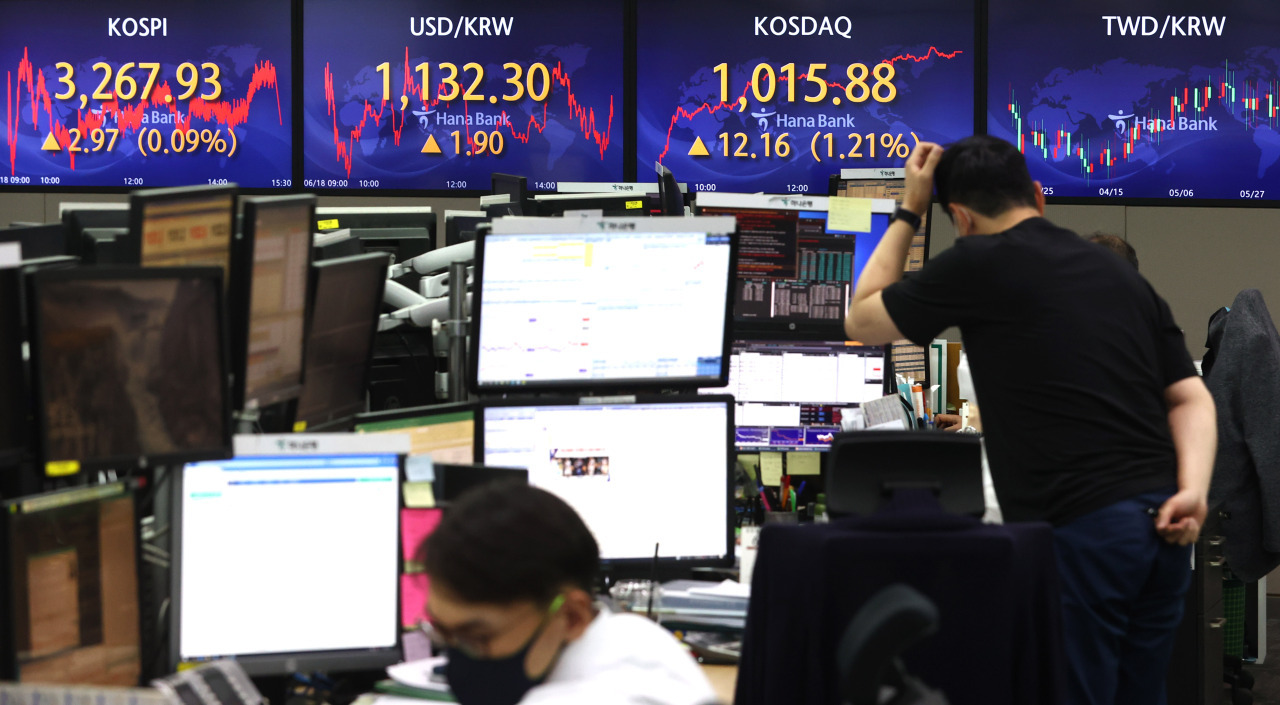Seoul stocks tipped to face selling pressure next week on inflation woes
By YonhapPublished : June 19, 2021 - 11:03

South Korean stocks are likely to come under selling pressure next week, as investors could take to the sidelines amid weakening local currency and uncertainties from the Fed's earlier-than-expected timeline for policy tightening, analysts said Saturday.
The benchmark Korea Composite Stock Price Index (KOSPI) closed at 3,267.93 points Friday, up 0.57 percent from a week ago.
The KOSPI set a new all-time high Wednesday on strong individual buying, backed by speculation that the US Federal Reserve would adhere to its support of accommodative monetary policies on Thursday's monetary meeting.
Such optimism broke the next day, however, when the Fed said it already began to discuss measures to pull back its asset-buying program. Key Fed officials speculated over the possibility of two rate hikes by 2023.
This week, foreigners sold a net 978 billion won ($864 million) worth of local stocks at the main bourse on early inflation jitters, while retail investors bought a net 2.1 trillion won. Institutions offloaded a net 1.1 trillion won.
Analysts said the selling pressure on the KOSPI may increase next week, largely due to lingering rate hike concerns.
"Now that the FOMC has started its tapering talks, investors would pay more attention to the future price indicators," said NH Investment & Securities analyst Kim Young-hwan.
"But the (on-year) price pressure may stabilize down the road, considering that the fallout from the pandemic peaked during the March-May period last year," he said.
Slowdown in price hike may also slow the Fed's time framing for its policy change, he added.
Meanwhile, analysts noted that the Fed's tapering remarks strengthened the US currency, fueling foreign sell-offs at the local bourse.
The tussle between weak Korean won and hopes of economic recovery is expected to continue playing out in the local markets, analysts said.
"The foreign exchange market seems to have reacted most strongly over the FOMC results," said Samsung Futures researcher Jeon Seung-ji. (Yonhap)
The benchmark Korea Composite Stock Price Index (KOSPI) closed at 3,267.93 points Friday, up 0.57 percent from a week ago.
The KOSPI set a new all-time high Wednesday on strong individual buying, backed by speculation that the US Federal Reserve would adhere to its support of accommodative monetary policies on Thursday's monetary meeting.
Such optimism broke the next day, however, when the Fed said it already began to discuss measures to pull back its asset-buying program. Key Fed officials speculated over the possibility of two rate hikes by 2023.
This week, foreigners sold a net 978 billion won ($864 million) worth of local stocks at the main bourse on early inflation jitters, while retail investors bought a net 2.1 trillion won. Institutions offloaded a net 1.1 trillion won.
Analysts said the selling pressure on the KOSPI may increase next week, largely due to lingering rate hike concerns.
"Now that the FOMC has started its tapering talks, investors would pay more attention to the future price indicators," said NH Investment & Securities analyst Kim Young-hwan.
"But the (on-year) price pressure may stabilize down the road, considering that the fallout from the pandemic peaked during the March-May period last year," he said.
Slowdown in price hike may also slow the Fed's time framing for its policy change, he added.
Meanwhile, analysts noted that the Fed's tapering remarks strengthened the US currency, fueling foreign sell-offs at the local bourse.
The tussle between weak Korean won and hopes of economic recovery is expected to continue playing out in the local markets, analysts said.
"The foreign exchange market seems to have reacted most strongly over the FOMC results," said Samsung Futures researcher Jeon Seung-ji. (Yonhap)








![[Kim Seong-kon] Democracy and the future of South Korea](http://res.heraldm.com/phpwas/restmb_idxmake.php?idx=644&simg=/content/image/2024/04/16/20240416050802_0.jpg&u=)








![[KH Explains] Hyundai's full hybrid edge to pay off amid slow transition to pure EVs](http://res.heraldm.com/phpwas/restmb_idxmake.php?idx=652&simg=/content/image/2024/04/18/20240418050645_0.jpg&u=20240418181020)

![[Today’s K-pop] Zico drops snippet of collaboration with Jennie](http://res.heraldm.com/phpwas/restmb_idxmake.php?idx=642&simg=/content/image/2024/04/18/20240418050702_0.jpg&u=)